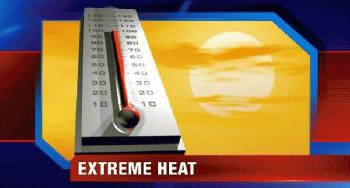 07/19/13 As the sweltering summer heat arrives, the Indiana Department of Child Services alerts parents about the dangers extreme heat can pose for infants, young children and older youth.
07/19/13 As the sweltering summer heat arrives, the Indiana Department of Child Services alerts parents about the dangers extreme heat can pose for infants, young children and older youth.
“Summertime can be some of the best times of a child’s life,” said DCS Director Mary Beth Bonaventura. “To help keep children safe so they can enjoy the summer weather, parents must be steadfast about the two most important safeguards against heat-related illnesses, staying cool and staying hydrated.”
Heat-related deaths and illnesses are preventable, but the U.S. Centers for Disease Control and Prevention reports that hundreds of people die yearly from excessive heat exposure. Infants, children and the elderly are the most vulnerable.
“It only takes a matter of minutes for children and infants to develop complications from extreme heat exposure,” said Robert Collins, medical director of emergency services at Riley Hospital for Children at Indiana University Health. “However, with diligent supervision, parents can keep kids safe this summer.”
People suffer from heat-related illnesses and death when their bodies are unable to cool themselves quickly enough. Infants and young children are more susceptible to trouble, since their cooling mechanisms have not fully matured, said Collins. The body normally cools itself by sweating, but under some conditions, sweating just is not enough. Extreme temperatures can cause body temperatures to rise too rapidly and when the humidity is high, sweat will not evaporate as quickly preventing the body from releasing heat quickly.
The CDC says air conditioning is the number one protective measure against heat-related illness. Shopping malls and other public facilities can be good places to spend time on high-heat days for families without air conditioning.
The CDC also recommends parents take these preventative steps for avoiding heat-related illness in children:
· Provide plenty of fluids, preferably water, throughout the day.
· Limit outdoor exposure, particularly during midday and in areas with concrete or asphalt surfaces.
· Remain in shaded areas when outdoors.
· Dress infants and children in cool, loose clothing, use sunscreen, and shade their heads and faces with hats and umbrellas.
· Never leave children in a parked car even for a few minutes.
Even with the windows slightly cracked, temperatures inside the car can rise by almost 20 degrees within as little as 10 minutes, says the CDC.
Watch for warning signs of heat illness
Parents should watch for the following signs of possible heat stroke or exhaustion:
· Body temperature above 103 degrees.
· Red, hot, dry skin with no sweating.
· Rapid, strong pulse.
· Complaints about headache.
· Dizziness or confusion.
· Nausea, vomiting.
If your child displays any of these symptoms, get medical assistance as soon as possible. If your child is not sweating, or has a rapid pulse, do not give them fluids. Until medical help arrives, monitor the child’s body temperature. Cool the child rapidly by moving them to a shady area, spray or sponge the child with cool water, or place the child in front of a fan or air conditioner.
“Our goal is to help children and families have a healthy and safe summer—one that does not involve a trip to the ER,” said Collins. “But if kids begin displaying symptoms of heat stroke or exhaustion, head to the emergency room immediately.”
About Indiana Department of Child Services:
DCS is committed to protecting children who are victims of abuse or neglect. The agency’s primary goal is to safely keep these children at home with their families by offering appropriate support services. It also manages the child support bureau. Indiana Child Abuse/Neglect Hotline: 800.800.5556 www.in.gov/dcs














